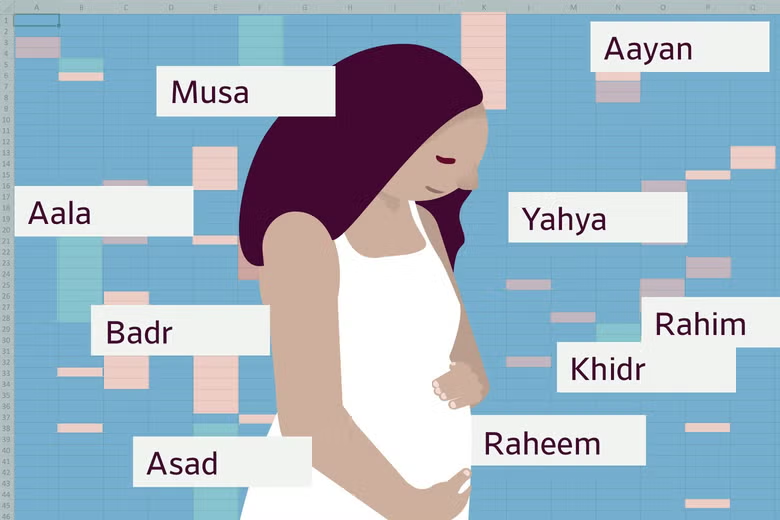Choosing a name for a child is one of the most significant decisions parents will make. In Islam, names are not merely labels but carry deep meanings, cultural heritage, and religious significance. This comprehensive guide aims to provide an in-depth understanding of Islamic name, their importance, and how to choose the perfect name for your child.
The Importance of Names in Islam
In Islamic tradition, names hold great importance and are considered a reflection of a person’s identity and character. The Prophet Muhammad (peace be upon him) emphasized the significance of giving good names to children, as these names carry blessings and positive attributes. A well-chosen name is believed to have a profound impact on a person’s life and can influence their behavior, personality, and destiny.
The Criteria for Choosing an Islamic Name
When selecting a name in accordance with Islamic values, several criteria should be considered:
- Meaning: The name should have a good and positive meaning. Names with noble, virtuous, and pleasant connotations are highly encouraged. Avoid names with negative or harmful meanings.
- Association with Prophets and Companions: Many Muslims choose names of Prophets, companions of the Prophet Muhammad (peace be upon him), and other significant figures in Islamic history. These names carry a sense of respect, honor, and a connection to Islamic heritage.
- Cultural Relevance: While Islamic names are often rooted in Arabic, they can also reflect cultural diversity. Names can be chosen from various Islamic cultures and regions, ensuring they are meaningful and relevant.
- Pronunciation and Ease: The name should be easy to pronounce and remember. It is important to consider how the name will be perceived and pronounced in different languages and cultures.
Popular Islamic Names for Boys
Islamic names for boys often carry meanings related to strength, piety, and noble qualities. Here are some popular choices:
- Muhammad: One of the most common names in the Muslim world, Muhammad means “praised” or “praiseworthy.” It is the name of the last Prophet of Islam.
- Ahmed: Another popular name, Ahmed means “highly praised” or “one who constantly thanks God.” It is a name often associated with the Prophet Muhammad (peace be upon him).
- Ali: Meaning “elevated” or “sublime,” Ali is the name of the fourth Caliph and a cousin of the Prophet Muhammad (peace be upon him).
- Hassan: This name means “handsome” or “good.” Hassan was the grandson of the Prophet Muhammad (peace be upon him).
- Ibrahim: The Arabic form of Abraham, Ibrahim means “father of many.” It is a significant name in Islam, shared by a major Prophet.
- Omar: Meaning “long-lived” or “eloquent,” Omar was the second Caliph and a close companion of the Prophet Muhammad (peace be upon him).
- Yusuf: This name means “God increases” and is associated with the Prophet Joseph in Islamic tradition.
Popular Islamic Names for Girls
Islamic names for girls often reflect beauty, grace, and piety. Here are some popular choices:
- Fatima: Meaning “captivating” or “one who abstains,” Fatima was the daughter of the Prophet Muhammad (peace be upon him) and is highly revered in Islam.
- Aisha: This name means “living” or “life.” Aisha was the wife of the Prophet Muhammad (peace be upon him) and a significant figure in Islamic history.
- Maryam: The Arabic form of Mary, Maryam means “beloved” or “wished for child.” It is the name of the mother of Jesus (peace be upon him) in Islamic tradition.
- Zainab: Meaning “fragrant flower,” Zainab was the name of the Prophet Muhammad’s (peace be upon him) daughter.
- Khadija: This name means “premature child” or “early baby.” Khadija was the first wife of the Prophet Muhammad (peace be upon him) and the first person to convert to Islam.
- Amina: Meaning “trustworthy” or “faithful,” Amina was the name of the Prophet Muhammad’s (peace be upon him) mother.
- Hafsa: This name means “young lioness.” Hafsa was one of the wives of the Prophet Muhammad (peace be upon him).
The Process of Naming in Islamic Tradition
Naming a child in Islam is often accompanied by certain customs and traditions. Here are some steps typically followed:
- Tahnik: This is the ritual of rubbing a small piece of softened date or honey on the baby’s palate. It is performed to ensure the baby’s first taste is sweet and to seek blessings.
- Adhan and Iqamah: The call to prayer (Adhan) and the call to commence prayer (Iqamah) are often recited in the baby’s ear. This practice is done to signify the importance of faith from the very beginning of life.
- Aqiqah: This is the sacrificial ceremony performed on the seventh day after the birth of the child. It involves the sacrifice of an animal, usually a sheep or goat, and is a way to give thanks to Allah for the blessing of the child.
- Shaving the Head: On the seventh day, the baby’s head is shaved, and the hair is weighed. The equivalent weight in silver or gold is given as charity.
- Choosing the Name: The name is often chosen by the parents after much consideration and consultation with family and religious leaders. It is announced during the Aqiqah ceremony.
The Significance of Names in Shaping Identity
A name is more than just a label; it plays a crucial role in shaping a person’s identity and self-perception. In Islam, names are believed to have a profound influence on an individual’s character and destiny. A good name can inspire confidence, a sense of belonging, and a connection to one’s religious and cultural heritage.
Islamic Names and Modern Trends
While traditional names remain popular, there is also a trend towards choosing unique and contemporary names that still adhere to Islamic values. Parents today often look for names that are meaningful, modern, and culturally relevant. This blend of tradition and modernity allows for a rich diversity in the choice of Islamic names.
Tips for Choosing the Perfect Name
Selecting the right name for your child can be a daunting task. Here are some tips to help you make the best choice:
- Research: Take the time to research the meanings and significance of various names. Consider their historical and cultural context.
- Consult Family and Religious Leaders: Seek advice and suggestions from family members and religious leaders. They can provide valuable insights and help you choose a name that aligns with Islamic values.
- Consider Pronunciation: Ensure the name is easy to pronounce and spell. A name that is too complicated may cause difficulties for the child in the future.
- Think About the Future: Consider how the name will sound and be perceived as your child grows older. Avoid names that may lead to teasing or mispronunciation.
- Reflect on Personal Preferences: Ultimately, the name should resonate with you and hold personal significance. Choose a name that you and your family feel connected to.
Conclusion
Choosing an Islamic name is a meaningful and important decision for Muslim parents. It is a reflection of faith, culture, and heritage. A well-chosen name can inspire a sense of identity, confidence, and belonging in a child. By considering the meaning, significance, and cultural relevance of a name, parents can ensure they select a name that aligns with Islamic values and traditions. Whether choosing a traditional name or a modern one, the essence of the name lies in its positive connotation and the blessings it brings to the child’s life.















